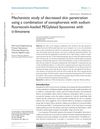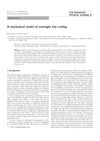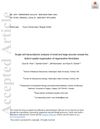 37 citations,
February 2014 in “Journal of Dermatology”
37 citations,
February 2014 in “Journal of Dermatology” Valproic acid increases hair count in men with hair loss.
 36 citations,
June 2014 in “International Journal of Dermatology”
36 citations,
June 2014 in “International Journal of Dermatology” Dutasteride helps hair growth in those unresponsive to finasteride, but may cause more sexual dysfunction.
 28 citations,
September 2014 in “Journal of Clinical Oncology”
28 citations,
September 2014 in “Journal of Clinical Oncology” Men with baldness at the front and top of their head at age 45 may have a higher risk of aggressive prostate cancer.
 7 citations,
February 2016 in “Dermatology and therapy”
7 citations,
February 2016 in “Dermatology and therapy” t-Flavanone helps improve male pattern hair loss by making hair roots stronger.
 October 2016 in “Iranian journal of psychiatry and behavioral sciences”
October 2016 in “Iranian journal of psychiatry and behavioral sciences” Sertraline, an antidepressant, may cause hair loss in rare cases.
 159 citations,
July 2006 in “Endocrine Reviews”
159 citations,
July 2006 in “Endocrine Reviews” Estrogens significantly influence hair growth by interacting with receptors in hair follicles and may help regulate the hair growth cycle.
 2 citations,
September 2022 in “Dermatologic Therapy”
2 citations,
September 2022 in “Dermatologic Therapy” Tofacitinib is a promising treatment for severe alopecia areata, with many patients experiencing complete or partial hair regrowth.
 6 citations,
December 2015 in “International journal of nanomedicine”
6 citations,
December 2015 in “International journal of nanomedicine” Using sonophoresis can make it harder for certain drug-loaded liposomes to get through the skin.
 688 citations,
June 2007 in “Cell Stem Cell”
688 citations,
June 2007 in “Cell Stem Cell” Removing the ATR gene in adult mice causes rapid aging and stem cell loss.
 19 citations,
January 2015 in “Current problems in dermatology”
19 citations,
January 2015 in “Current problems in dermatology” Ultraviolet rays damage hair, smoking may cause hair loss, and good nutrition is important for hair health, but genetics mainly decide hair thickness.
10 citations,
September 2015 in “BMC pharmacology & toxicology” Gloriosa superba poisoning can mimic severe tropical infections and cause rapid hair loss.
 4 citations,
May 2019 in “Skin Research and Technology”
4 citations,
May 2019 in “Skin Research and Technology” Finasteride helps hair growth but stopping it causes faster hair loss.
 September 2015 in “The European physical journal. E, Soft matter and biological physics/The European physical journal. E, Soft matter”
September 2015 in “The European physical journal. E, Soft matter and biological physics/The European physical journal. E, Soft matter” Longer time setting curls overnight leads to better curl retention.
10 citations,
November 2008 in “Veterinary Dermatology” The mouse hairy ears mutation causes longer ear hair due to changes in gene expression.
 1 citations,
July 2007 in “Regenerative Medicine”
1 citations,
July 2007 in “Regenerative Medicine” Stem cell research and regenerative medicine have made significant advancements in treating various diseases and conditions.

Human hair keratins can be turned into useful 3D biomedical scaffolds through a freeze-thaw process.
 July 2024 in “ACS Biomaterials Science & Engineering”
July 2024 in “ACS Biomaterials Science & Engineering” Nanoencapsulated antibiotics are more effective in treating hair follicle infections than free antibiotics.
 9 citations,
February 2022 in “BMC Genomics”
9 citations,
February 2022 in “BMC Genomics” Melatonin affects gene expression in goat hair follicles, potentially increasing cashmere production.
2 citations,
May 2021 in “International journal of molecular sciences” Stem cells from hair follicles in a special gel show strong potential for bone regeneration.

The polyherbal hair mask is a safe and effective alternative for improving hair health.
1 citations,
December 2022 in “Bioactive Materials” The microneedle patch with quercetin, zinc, and copper effectively promotes hair regrowth for androgenic alopecia.
 42 citations,
August 2013 in “International Journal of Women's Health”
42 citations,
August 2013 in “International Journal of Women's Health” Female pattern hair loss is caused by multiple factors and while treatments like topical minoxidil, hormone therapy, and low-level light therapy can help, none can fully cure it.
13 citations,
August 2018 in “Life sciences” Kang-ai injection with platinum-based chemotherapy improves tumor response and immune function while reducing side effects in advanced lung cancer.
 24 citations,
January 2006 in “Skin Pharmacology and Physiology”
24 citations,
January 2006 in “Skin Pharmacology and Physiology” Finasteride reverses early hair loss and promotes growth.
 56 citations,
April 2007 in “Journal der Deutschen Dermatologischen Gesellschaft”
56 citations,
April 2007 in “Journal der Deutschen Dermatologischen Gesellschaft” Minoxidil works better for female hair loss than alfatradiol, both safe.
 35 citations,
November 2020 in “Experimental Dermatology”
35 citations,
November 2020 in “Experimental Dermatology” Different types of skin cells are organized in a special way in large wounds to help with healing and hair growth.
 165 citations,
February 1994 in “Fertility and Sterility”
165 citations,
February 1994 in “Fertility and Sterility” Flutamide is more effective and has fewer side effects than spironolactone for treating hirsutism.
 4 citations,
October 2022 in “Cell Reports Physical Science”
4 citations,
October 2022 in “Cell Reports Physical Science” New wound healing method using nanoparticles in a gel speeds up healing and reduces infection and inflammation.
 92 citations,
June 2010 in “Journal of The American Academy of Dermatology”
92 citations,
June 2010 in “Journal of The American Academy of Dermatology” Dutasteride 0.5 mg daily improves hair growth safely in men with hair loss.
 15 citations,
January 2021 in “Journal of Materials Chemistry B”
15 citations,
January 2021 in “Journal of Materials Chemistry B” Silk nanofiber hydrogels help stem cells heal wounds faster and improve skin regeneration.

























